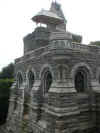
|
New York Architecture Images- Central Park Belvedere Castle |
|
architect |
Olmsted and Vaux |
|
location |
Vista Rock, center of Central Park at 81st Street. |
|
date |
1872 |
|
style |
High Victorian Gothic |
|
construction |
|
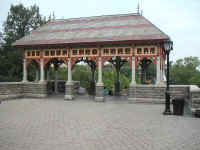 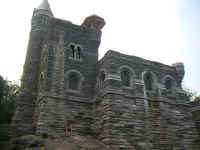 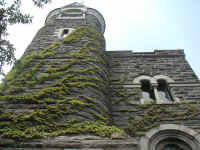 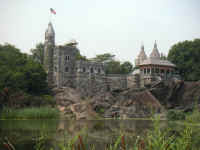 |
|
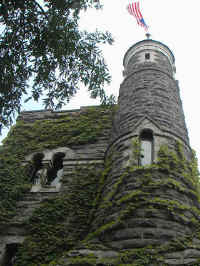 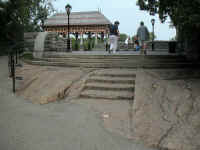 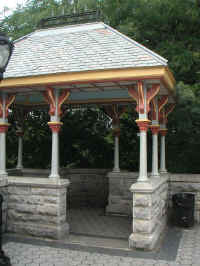 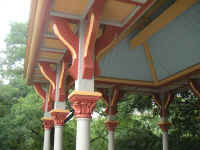 |
|
|
type |
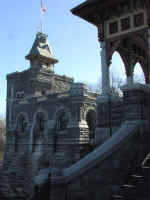 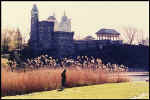  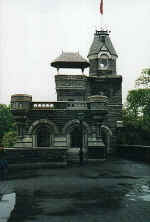 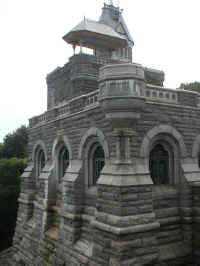 |
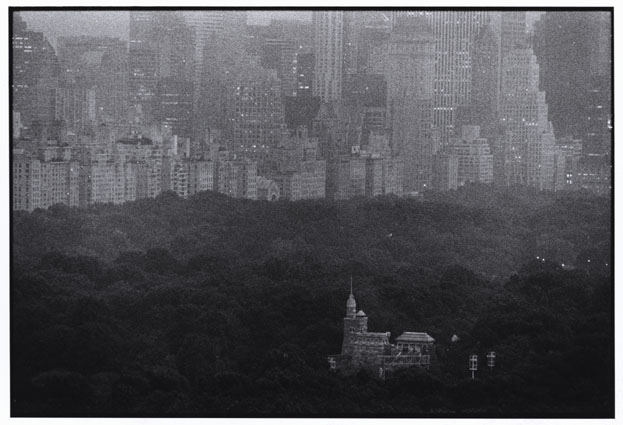 |
|
|
|
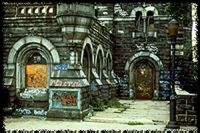
|
|
images |
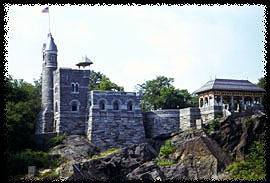
 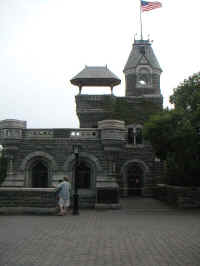 |
|
|
Perched on Vista Rock, the second highest natural elevation in the Park, is
Belvedere Castle. Belvedere, Italian for panoramic viewpoint,
offers visitors just that. You can look down into the Delacorte Theater to
the left, home to summertime Public Theater productions of Shakespeare and
cutting edge interpretations of new and classic plays. Straight ahead is the
newly-restored, 55-acre Great Lawn, once one of the Park's original
reservoirs; now it offers softball fields, basketball courts, and an
abundance of sunbathers. And below, with a boulder-strewn shoreline, is
Turtle Pond.
What about the Castle itself? Belvedere was originally designed by Frederick Law Olmsted and Calvert Vaux as a Victorian "folly." In architectural terms, a folly was a spot of playfulness, a fantasy building - a miniature Greek or Roman temple or a pint-sized Gothic castle - that offered a dash of the unexpected in a carefully calculated pastoral landscape. The Castle originally was only a shell, with open window frames, and doorways, really an elaborate scenic overlook. Today, Belvedere Castle has true windows and doors and is home to the Henry Luce Nature Observatory, run by the Central Park Conservancy. Inside are simple displays that show how naturalists observe the world to learn how it works, and how they share their findings. There are telescopes and microscopes and skeletons and feathers - all designed to pique the curiosity of young visitors. On the Castle's second floor, papier mâché reproductions of birds often seen in Central Park roost in the branches of a plywood tree. (Few people know that Central Park is one of the country's richest birdwatching areas, located on the Atlantic flyway.) By pushing a button on a recording box, visitors also can listen to the particular songs belonging to the birds in the "tree." Budding naturalists can borrow backpacks that contain binoculars, reference material, maps, and notepaper, and take off to explore either the Ramble (home to many species of birds), or to study aquatic life at the edge of Turtle Pond. If you have lived in the City for any length of time you've probably heard the phrase, "The temperature in Central Park is.…" The information is coming from meteorological instruments located at Belvedere. In fact, data has been collected at this site by the U.S. Weather Bureau since 1919. Look for the automated meteorological equipment on the top of the peaked tower roof and in the fenced-in compound to the south of the castle. If you want to find out whether your picnic will be rained out, stop at the second floor to get an up-to-the-minute weather report |
|
links |
thanks to www.centralpark2000.com & www.centralparknyc.org |